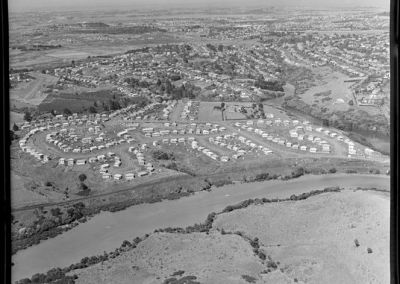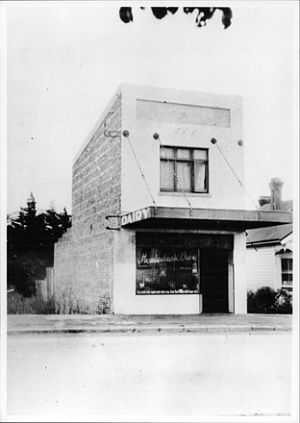Rona Von Zalinski Remembers Meadowbank
I loved Meadowbank when I moved here in 1940 with my young Air Force husband and our two small daughters and I have loved it ever since.
There were then houses only in Meadowbank and Harapaki Roads. A small dairy at the top of the rise faced a large strip of unoccupied land to the left, on which stood a large hedge of roses, and a well in the ground, evidence of an earlier resident. This land looking toward Orakei had previously been grazed by cows belonging to the Presbyterian orphanage at the left end of Meadowbank Road. A Chinese market garden occupied the right side of the road and we bought fresh vegetables there. The Presbyterian Orphanage was noted for its well-mannered children who attended Meadowbank School. The orphanage was later demolished and the present large hospital replaced it.
State houses were built in Bonnie Brae Road in 1941 and then about two hundred on the right of Meadowbank Road looking towards Orakei in approximately 1946. No buses ran down Meadowbank Road during the war and there was no entertainment except for the Tudor theatre in Remuera. Few wives ventured out after dark, with most husbands overseas in the armed forces. Cars were not allowed during the war – only one resident had a car and she was frequently called on to take a patient to hospital or Nursing Home.
I started an evening class at my home and it was most popular. We had a lecturer from the WEA (Workers Educational Association) an English group who offered a variety of subjects: childcare, finance problems and similar useful topics. The evenings ended happily with supper and a short walk home. The service was free – remember there was no Family Benefit in those days. We were all hard up and always shared homemade cookies and garden produce and we minded each other’s little ones. Imagine how welcome Family Benefit was when it later came in and we got ten shillings (one dollar) a week for each child! We were made!
We had quite a walk up Meadowbank Road to the shops at the tram terminus on Remuera Road. There was a grocer, chemist, butcher, stationery shop, baker and for a while, a draper (now the greengrocers). We’d leave our prams outside these shops when we caught the tram to town. There was no fear of thieves in those days. Or we could hook the prams on to the back of the tram if we wanted to take them with us. The fare to Auckland was sixpence (five cents). Newspapers cost two pence.
The war finished and our husbands came home. It was wonderful to have them back but they needed entertainment. We needed a local hall. We petitioned the Government and were given one of the buildings that had housed poor wounded American servicemen in Cornwall Park. Many of them died there. There was no transporting of whole buildings in those days. It had to be disassembled, carted to Meadowbank and rebuilt as our Hall. Our husbands did it all without complaint, working every Saturday and Sunday. No one received wages. Our only expense was for an electrician, as we did not have one living in the district. It really was a wonderful achievement.
Once built, of course, we required kitchen equipment, seats, furniture and crockery. These were paid for by a Queen Carnival, raffles, Bring and Buy afternoons, card evenings etc. It was all done happily as was our Opening Night with the then Mr Ronald Algie and his wife, and Mr and Mrs Hackett as our guests. The former always remained a good friend to our Progressive Society, which now had a real home. That was in 1948. The hall became a Kindergarten, a depot for Plunket, a Returned Services Association, a club for indoor bowlers, physical education groups, a Sword Club and is still in use.
Around it we organised annual sports days. The first year the winner’s podium was just crates where my daughter Valerie stood proudly in first place, but by next year someone had made a much smarter stand. Other community actions were getting the railway station shifted from Purewa cemetery to the bottom of Manapau Street and persuading the Auckland Transport Board to at last give us a bus service comparable to that of Victoria Avenue.
I doubt that many people know the history of the hall now. Most of the original workers who built the hall have passed on but they would be happy to see modern users of the hall enjoying it sixty years afterwards, knowing what it had done to enrich our lives in Meadowbank.

